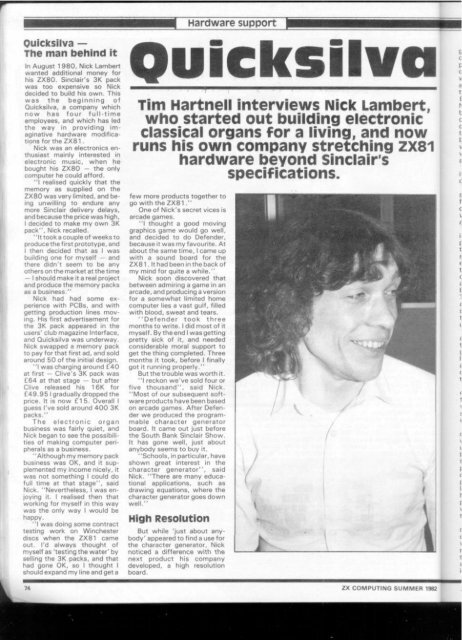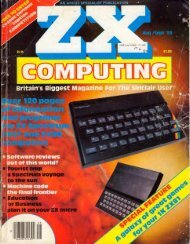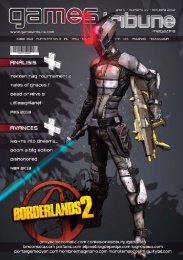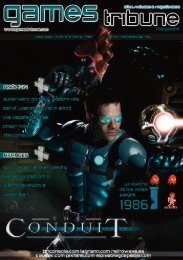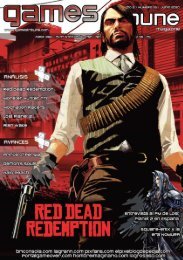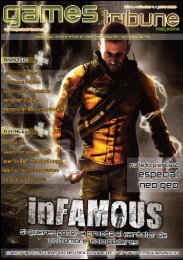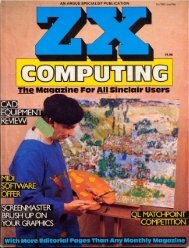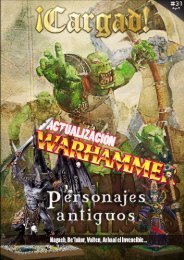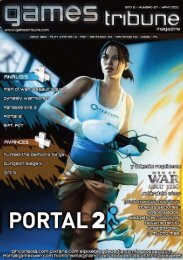ZX Computings - OpenLibra
ZX Computings - OpenLibra
ZX Computings - OpenLibra
Create successful ePaper yourself
Turn your PDF publications into a flip-book with our unique Google optimized e-Paper software.
Quicksilva —<br />
The man behind it<br />
In August 1 980, Nick Lambert<br />
wanted additional money for<br />
his <strong>ZX</strong>80. Sinclair's 3K pack<br />
was too expensive so Nick<br />
decided to build his own. This<br />
was the beginning of<br />
Quicksilva, a company which<br />
now has four full-time<br />
employees, and which has led<br />
the way in providing imaginative<br />
hardware modifications<br />
for the <strong>ZX</strong>81.<br />
Nick was an electronics enthusiast<br />
mainly interested in<br />
electronic music, when he<br />
bought his <strong>ZX</strong>80 - the only<br />
computer he could afford.<br />
"I realised quickly that the<br />
memory as supplied on the<br />
<strong>ZX</strong>80 was very limited, and being<br />
unwilling to endure any<br />
more Sinclair delivery delays,<br />
and because the price was high,<br />
I decided to make my own 3K<br />
pack", Nick recalled.<br />
"It took a couple of weeks to<br />
produce the first prototype, and<br />
I then decided that as I was<br />
building one for myself — and<br />
there didn't seem to be any<br />
others on the market at the time<br />
— I should make it a real project<br />
and produce the memory packs<br />
as a business."<br />
Nick had had some experience<br />
with PCBs, and with<br />
getting production lines moving.<br />
His first advertisement for<br />
the 3K pack appeared in the<br />
users' club magazine Interface,<br />
and Quicksilva was underway.<br />
Nick swapped a memory pack<br />
to pay for that first ad, and sold<br />
around 50 of the initial design.<br />
"I was charging around £40<br />
at first — Clive's 3K pack was<br />
£64 at that stage — but after<br />
Clive released his 16K for<br />
£49.951 gradually dropped the<br />
price. It is now £15. Overall I<br />
guess I've sold around 400 3K<br />
packs."<br />
The electronic organ<br />
business was fairly quiet, and<br />
Nick began to see the possibilities<br />
of making computer peripherals<br />
as a business.<br />
"Although my memory pack<br />
business was OK, and it supplemented<br />
my income nicely, it<br />
was not something I could do<br />
full time at that stage", said<br />
Nick. "Nevertheless, I was enjoying<br />
it. I realised then that<br />
working for myself in this way<br />
was the only way I would be<br />
happy.<br />
"I was doing some contract<br />
testing work on Winchester<br />
discs when the <strong>ZX</strong>81 came<br />
out. I'd always thought of<br />
myself as 'testing the water' by<br />
selling the 3K packs, and that<br />
had gone OK. so I thought I<br />
should expand my line and get a<br />
Hardware support<br />
QuicksHva<br />
Tim Hartnell interviews Nick Lambert,<br />
who started out building electronic<br />
classical organs for a living, and now<br />
runs his own company stretching <strong>ZX</strong>81<br />
hardware beyond Sinclair's<br />
specifications.<br />
few more products together to<br />
go with the <strong>ZX</strong>81."<br />
One of Nick's secret vices is<br />
arcade games.<br />
"I thought a good moving<br />
graphics game would go well,<br />
and decided to do Defender,<br />
because it was my favourite. At<br />
about the same time, I came up<br />
with a sound board for the<br />
<strong>ZX</strong>81. It had been in the back of<br />
my mind for quite a while."<br />
Nick soon discovered that<br />
between admiring a game in an<br />
arcade, and producing a version<br />
for a somewhat limited home<br />
computer lies a vast gulf, filled<br />
with blood, sweat and tears.<br />
"Defender took three<br />
months to write. I did most of it<br />
myself. By the end I was getting<br />
pretty sick of it, and needed<br />
considerable moral support to<br />
get the thing completed. Three<br />
months it took, before I finally<br />
got it running properly."<br />
But the trouble was worth it.<br />
"I reckon we've sold four or<br />
five thousand", said Nick,<br />
"Most of our subsequent software<br />
products have been based<br />
on arcade games. After Defender<br />
we produced the programmable<br />
character generator<br />
board. It came out just before<br />
the South Bank Sinclair Show.<br />
It has gone well, just about<br />
anybody seems to buy it.<br />
"Schools, in particular, have<br />
shown great interest in the<br />
character generator", said<br />
Nick. "There are many educational<br />
applications, such as<br />
drawing equations, where the<br />
character generator goes down<br />
well."<br />
High Resolution<br />
But white 'just about anybody'<br />
appeared to find a use for<br />
the character generator, Nick<br />
noticed a difference with the<br />
next product his company<br />
developed, a high resolution<br />
board.<br />
74 <strong>ZX</strong> COMPUTING SUMMER 1982<br />
/<br />
\<br />
/


